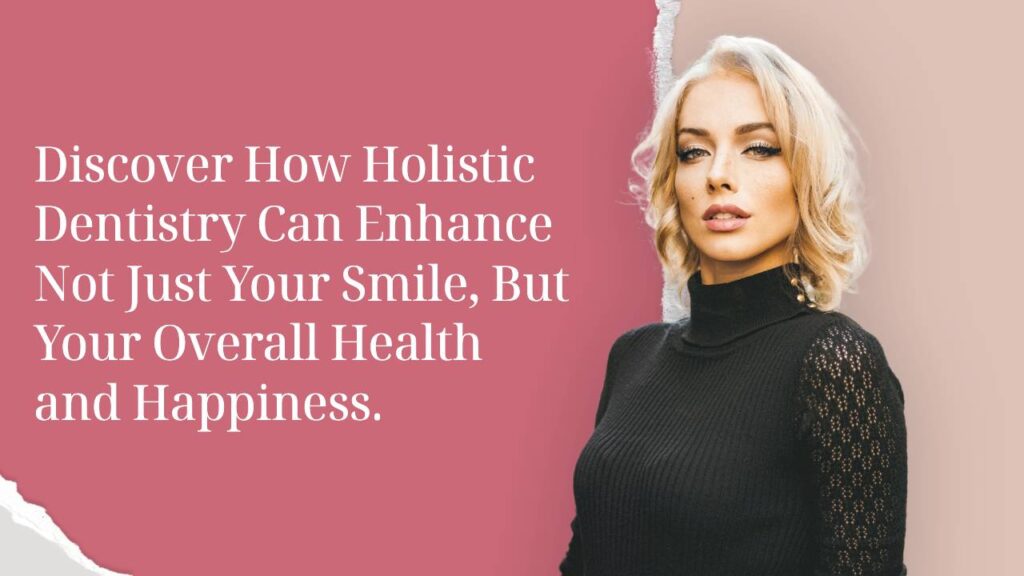You may not realize it, but traditional dental practices not only impact your teeth and gums but can also affect your overall health.
By exploring the benefits of holistic dentistry, you can uncover a whole new approach to oral care that focuses on treating the root cause of dental issues and promoting wellness in every aspect of your life.
From using biocompatible materials in treatments to considering the impact of oral health on your immune system and mental well-being, holistic dentistry offers a comprehensive and mind-body approach to dental care that can enhance not just your smile, but your overall quality of life.
Let’s probe into how this alternative form of dentistry can transform your oral health and well-being.
Key Takeaways:
- Focus on Whole-body Health: Holistic dentistry considers the connection between oral health and overall well-being, addressing not just the symptoms but also the root causes of dental issues.
- Natural, Non-toxic Treatment Options: This approach utilizes biocompatible materials and avoids harmful chemicals, leading to safer treatments and reducing the risk of adverse reactions or long-term health effects.
- Emphasis on Patient Education and Prevention: Holistic dentists prioritize educating patients on maintaining good oral health practices and preventing future problems, empowering individuals to take control of their dental and overall health.
Principles of Holistic Dentistry
One of the key principles of holistic dentistry is to approach dental care with a focus on the overall health and well-being of the individual, rather than just treating the symptoms.
This approach emphasizes the importance of using natural, non-toxic materials and techniques to promote not just a healthy smile, but a healthy body and mind as well.
Biocompatible Materials
For holistic dentists like Dr. Ashish Patel, the use of biocompatible materials is crucial in promoting the body’s natural healing processes and reducing the risk of adverse reactions.
These materials are carefully selected to be compatible with the tissues in the mouth and body, minimizing the risk of allergic reactions or other harmful effects. Examples of biocompatible materials include BPA-free composites, ceramic implants, and ozone therapy for disinfection.
Choosing biocompatible materials not only promotes better oral health but also contributes to the overall health of the individual. By avoiding the use of toxic materials commonly found in traditional dental practices, holistic dentists can help patients achieve a healthier, more balanced state of being.
Avoidance of Toxins in Dental Practices
The elimination of toxins in dental practices is a key focus of holistic dentistry. Traditional dental treatments often involve the use of materials such as mercury amalgam fillings, which can release harmful vapors into the body. Holistic dentists prioritize the use of safe, non-toxic alternatives to protect both the patient and the environment.
For instance, holistic dentists advocate for the removal of mercury amalgam fillings and their replacement with biocompatible materials to eliminate the risk of mercury exposure and potential health complications. By following stringent safety protocols and using advanced technologies, holistic dentists ensure that dental treatments are not only effective but also safe for their patients.
Benefits of Holistic Dentistry
Even though traditional dentistry focuses mainly on treating oral health issues, holistic dentistry takes a broader approach by considering the connection between oral health and overall well-being. It emphasizes the importance of a healthy mouth not just for a beautiful smile, but for the health of the entire body.
Emphasis on Prevention and Nutrition
With holistic dentistry, there is a strong emphasis on prevention rather than just treating dental problems after they arise. Dentists work with patients to develop personalized dental care plans that focus on maintaining optimal oral health through regular cleanings, check-ups, and education on proper oral hygiene practices.
Nutrition is also a key component of holistic dentistry. Dentists educate patients on how diet can impact oral health and overall well-being. They may recommend nutrient-rich foods that support healthy teeth and gums and advise against sugary, acidic foods that can contribute to dental issues.
Overall Health Improvement Strategies
Health is not just about the absence of disease—it’s a state of physical, mental, and emotional well-being. Holistic dentistry recognizes this and offers strategies to improve overall health alongside oral health. These may include stress management techniques to reduce the impact of stress-related oral health issues, as well as recommendations for exercise and other lifestyle changes that can benefit both the mouth and body.
Holistic Dental Treatments and Techniques
Unlike traditional dentistry which only focuses on treating the symptoms, holistic dentistry takes into account the whole body and how it relates to oral health. By utilizing natural and non-toxic treatments, holistic dentistry offers a more comprehensive and health-focused approach to dental care.
Safe Mercury Amalgam Removal
Amalgam fillings contain mercury, a toxic substance that can pose serious health risks. Holistic dentists are trained in safe mercury amalgam removal techniques to minimize the exposure of mercury vapors during the removal process.
Special precautions such as using a rubber dam, high-speed suction, and protective gear are used to ensure the safety of both the patient and the dental team.
It’s crucial to seek a holistic dentist who follows the International Academy of Oral Medicine and Toxicology (IAOMT) guidelines for safe mercury amalgam removal to prevent any potential health hazards associated with mercury exposure.
Innovative Uses of Ozone Therapy
Ozone therapy is a cutting-edge treatment that harnesses the power of ozone gas to fight bacteria, viruses, and fungi in the mouth. Holistic dentists are incorporating ozone therapy into their practice for its antimicrobial and healing properties. Ozone can be used to disinfect root canals, treat gum disease, and even help in the remineralization of teeth.
For instance, ozone therapy can be a valuable tool in reducing the need for antibiotics and preventing the development of antibiotic-resistant strains of bacteria in the mouth, promoting a healthier oral environment overall.
Choosing a Holistic Dentist
Not all dentists are created equal, especially when it comes to holistic dentistry. Choosing the right holistic dentist can make a significant impact on your oral health, overall well-being, and happiness. Here’s how to find the perfect holistic dentist for your unique needs.
What to Look for in a Holistic Dental Practice
Any reputable holistic dental practice should focus on the connection between oral health and the body as a whole. Look for a dentist who uses biocompatible materials in dental work, practices mercury-free dentistry, and emphasizes preventative care and patient education.
A holistic dentist should also offer alternative therapies like ozone therapy, nutritional counseling, and detoxification protocols to support your overall health.
Questions to Ask Your Prospective Holistic Dentist
When choosing a holistic dentist, it’s crucial to ask the right questions to ensure they align with your values and treatment preferences. Ask about their training and experience in holistic dentistry, the biological materials they use, and their approach to treating common dental issues like cavities and gum disease. Additionally, inquire about how they minimize exposure to toxins during procedures and their protocols for safe amalgam removal if needed.
The relationship between you and your holistic dentist is crucial for your oral health journey. Open communication, shared values, and a commitment to whole-body wellness are key aspects to consider when selecting the right holistic dentist for you.
Conclusion
Now, you have learned how holistic dentistry can do more than just improve your smile. By focusing on the connection between oral health and overall well-being, holistic dentistry can enhance your overall health and happiness.
By considering your unique needs and using natural, biocompatible materials and treatments, holistic dentistry offers a comprehensive approach to dental care that benefits not only your teeth and gums but also your entire body. Embrace holistic dentistry to experience the positive impact it can have on your health and well-being.
FAQ
Q: What is holistic dentistry?
A: Holistic dentistry is an approach to oral health that considers the wellness of the entire body, not just the teeth and gums. It focuses on how dental health can impact overall health and happiness.
Q: How does holistic dentistry differ from traditional dentistry?
A: Holistic dentistry takes a whole-body approach, considering the connections between oral health and overall well-being. It may include alternative treatments, biocompatible materials, and a focus on prevention rather than just treating symptoms.
Q: What are the benefits of holistic dentistry?
A: Holistic dentistry can enhance not only your smile but also your overall health and happiness. By addressing the root causes of dental issues and promoting overall wellness, you can improve your quality of life and potentially reduce the risk of certain systemic diseases.
Q: What treatments are offered in holistic dentistry?
A: Holistic dentists may offer a range of services, including mercury-free fillings, ozone therapy, herbal mouth rinses, nutritional counseling, and non-toxic materials for restorations. They prioritize minimally invasive approaches and aim to support the body’s natural healing abilities.
Q: How can I find a reputable holistic dentist?
A: To find a qualified holistic dentist, look for practitioners who are members of holistic dental associations, have positive patient reviews, and prioritize open communication and patient education. It’s important to schedule a consultation to discuss your individual needs and treatment options.

